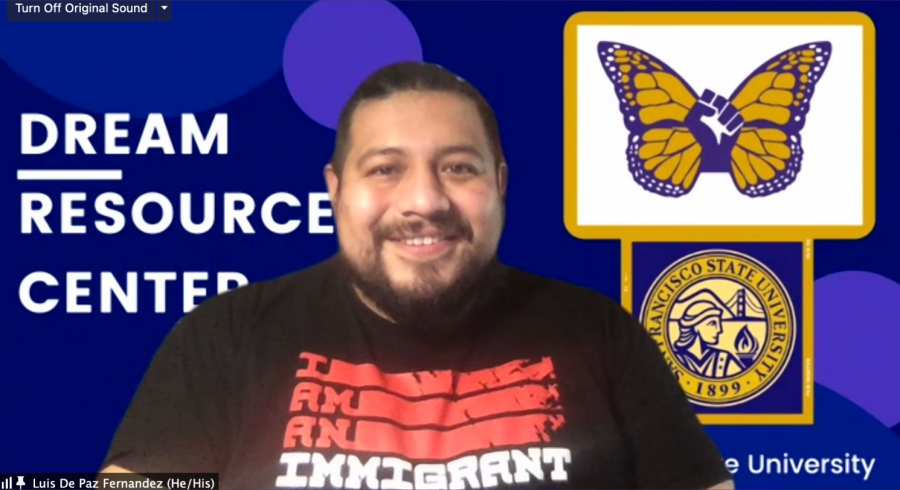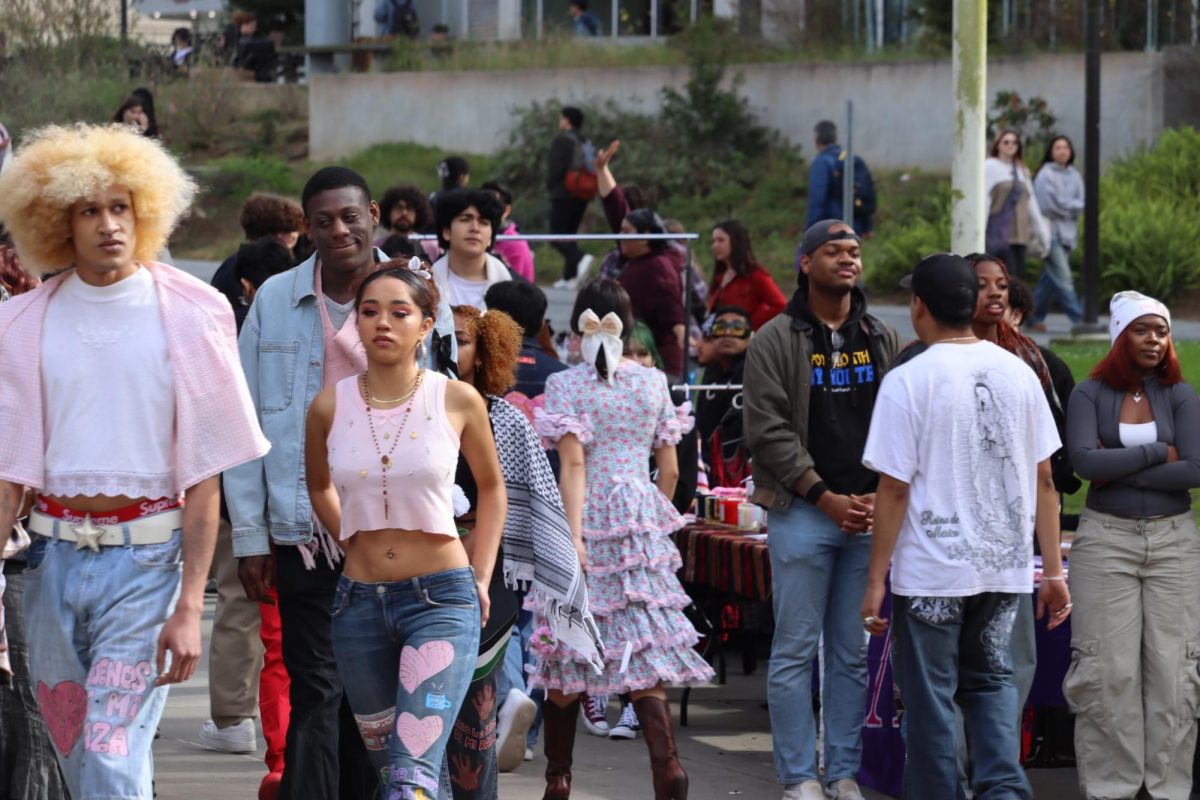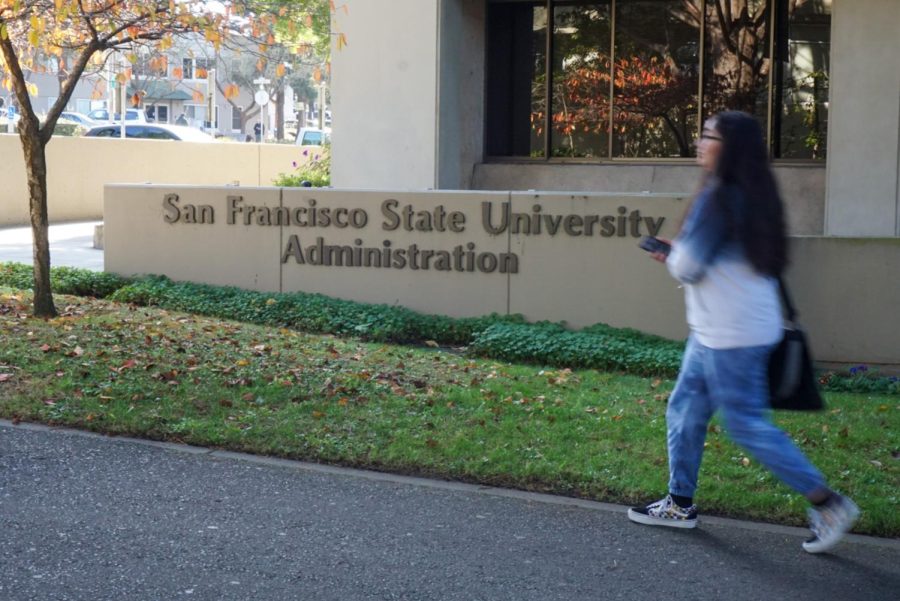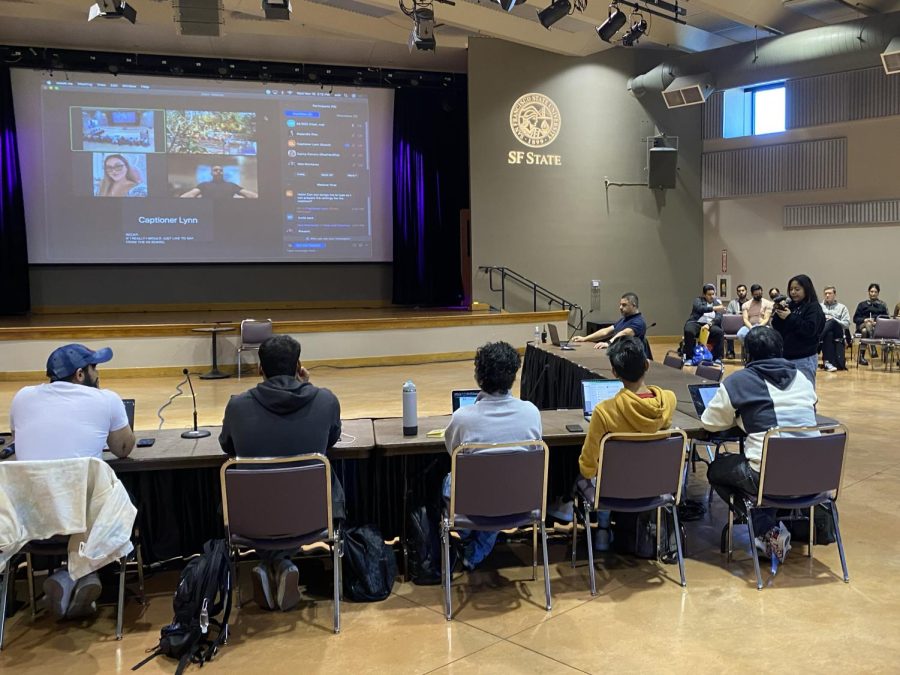Welcome to Gator Talk, a collaborative CalState podcast that brings city and statewide perspectives to SF State news.
In Gator Talk’s fifth episode, host Sebastian shares the main story spot with Golden Gate Xpress campus new reporter; Ari Arciaga. They both conducted interviews regarding the DACA event held on SF State campus and discussed recent updates with an unnamed Immigration bill introduced in congress by Democrats.
TRANSCRIPT:
Intro
*Salsa song fades in*
Seb: We’re back from our Friday hiatus – we just needed a Ted Cruz vacation!
This is Sebastian Mino-Bucheli, I’m your multimedia editor and your host for Gator Talk, a Golden Gate Xpress podcast that brings news to Sf State students.
For more information/coverage, check out goldengatexpress.org OR @GatorTalkPod on all social media platforms.
Preview of the show
Seb: Here’s a quick preview of the show:
I’ll be updating the audience with a quick news brief with news that happened this week that matters to SF State students.
City reporter, Ari Arciaga will be joining in for the main story.
News brief
Seb:
-Golden Gate Xpress Magazine released their first Issue, last Friday. Their theme is fashion. Catch it on their website xpressmagazine.org
-Last Tuesday, City Lights founder and beat poet, Lawrence Ferlinghetti passed away at the age of 101.
Golden Gate Xpress’ Diversity Editor, Anais Ophelia wrote about the loss of a literary giant well respected in the City, as well as his contributions to SF State.
-San Francisco Unified School District has put a pause on the controversial school renaming till students go back to school.
A decision is still imminent about what the plan will like. Supervisor Walton will act as a mediator to establish a plan between SF Teachers Union and the public school district We spoke to Walton a few weeks ago, here on GatorTalk too – go check it out!
Seb: That’s it for the news brief.
I’m going to pass the microphone on to Ari Arciaga. Ari will set up the main story.
Main Story
Ari: Hello, this is Ari Arciaga, city reporter from the Golden Gate Xpress. I’m going to set the scene up.
On February 18, Congressional Democrats introduced an unnamed immigration bill that would allow 11 million undocumented immigrants in the United States to apply for citizenship.
The bill gives Individuals who have been living in the United States a 8 year path to citizenship. If those individuals pass background checks and pay taxes, they are eligible to live and work in the United States for the next 5 years. Then they could apply for a green card which gives them the opportunity to obtain full citizenship within 3 years.
On February 23, SF State’s Dream Resource Center (DRC) held a Deferred Action for Childhood Arrivals(DACA) workshop event with the co-founder and managing attorney for Immigration Legal Defense (ILD), Barbara Pinto.
The ILD is a nonprofit agency directly working with SF State that provides immigration legal services to students, staff and faculty– as well as their family members. ILD services are available for SF State students and faculty online at https://drc.sfsu.edu/legalservices.
At the DRC, they work with all undocumented students who are under DACA, SB 68 and AB 540, which exempts nonresidential students from paying the nonresidential student tuition.
Ari: After the DACA event was held on campus, I had a separate interview with Luis De Paz Fernandez, he’s the AB540 DREAM Coordinator. It’s a position in which he can help provide resources to DACA students so that they can succeed in higher learning. Luis gave me some more insight on the event and program.
Luis: Yes. So my title is I’m the AB540 dream coordinator. I’m part of the Division of Equity Community Inclusion so under our division we have the different centers in areas that we serve so you know they have the black community center. You know, we have ASPIRED, and then I’m under the Office of interfaith programs. And Student Equity there’s probably programming for Latinx students, Pride Center, b ut in the Dream Resource Center essentially it’s me the coordinator. I have one student assistant and a wonderful assistant. And I actually have five interns, so that’s kind of like the team.
Ari: Deferred Action for Childhood Arrivals, or DACA, is a status to immigrant youth who came to the United States at an early age and allows them to receive a work permit while also protecting them from deportation.
Luis: The Dream Resource Center was created as a response to the Trump administration,” “We understood that the students were
going to be attacked and the Associated Students in the university, as well, they came together and decided it’s time we need to provide some services for our students.
Ari: The event guided students through the DACA application process and discussed the updates in the DACA program due to a change in the Presidential administration.
Luis: Immigration is not something that I can just wake up one day and be like, you know what, I don’t want to be undocumented today,” “It’s an identity, and it’s something that our students are dealing with every day on top of everything else. It’s important to make sure that they know that we’re here for them, that we support them. And that, yes, your education is first but we understand that there’s something else as well.
Ari: Though Luis is the only person in charge of the Dream Resource Center, he is able to have these programs for students, staff and faculty. Next month the Division of Equity Community will be hosting an event discussing the Muslim Ban.
Luis: And so you know, what we do is really, where the center part of the Division of equity community inclusion, who really focused on helping our undocumented students, their families, and really not just students, actually, you know, faculty and staff as well. Believe it or not, we have, you know, anything that has to do with immigration, really, that impacts our, as a state Gator community.
Ari: If you’re a student, staff or faculty you’re able to attend these events. Your information will always remain confidential.
This was Ari Arciaga
And with that, I’m signing off.
Seb: We’re gonna take a quick break.
Break
Seb: Support the Golden Gate Xpress’ work by signing up for our online newsletter, following us on Instagram or Twitter @ GGXnews and visiting the website: https://goldengatexpress.org
Interested in advertising with GGX? Check out our advertising page on goldengatexpress.org/advertising.
Matthew Faludi, campus news reporter premiered his video: SF State Studio Art Majors Weigh in on Remote Learning. Check it out at the multimedia section of our website.
https://goldengatexpress.org/96383/latest/multimedia/sf-state-studio-art-majors-weigh-in-on-remote-learning/
*break ends*
Main Story, cont.
Seb: I spoke with Professor Brigitte Davila regarding the recent rumblings with news regarding the immigration bill introduced in congress by Democrats.
Professor Davila teaches in the Latina/o Studies department at San Francisco State. In 2018, Professor Davila ran again for re-election and won a seat to serve on the San Francisco City College Board.
Professor Davila: I teach US government and policy class. And so we do talk about immigration as part of that but I teach in Latino Studies and we do have an immigration class there. That just focuses on immigration history, and what’s the trends in immigration reform right now.
So, so all of these DACA students can breathe a big sigh of relief because they are already in the program. And they are safe for now. But, what, what the immigration bill would do was go further than that, and provide them an opportunity not only for legalization but for citizenship.
Seb: We dove into talking about the immigration bill and whether it will pass or not. President Biden has been in government for so long that he knows what types of bills could pass.
Davila: I think that you’ll see partisan support, you might see some bipartisan support with some Republicans peeling away. This used to be. I mean, it almost seems like the old the good old days now when Bush was really pushing for this back in the early 2000s, and we know 9/11, ended any of those hopes but you had Republicans supporting this as well and then it got very politicized during the Trump administration.
What Biden would do is do what DACA did as an executive action, and also Obama’s other executive action for the parents, it would include all of them to be able to not only legalize, but to get citizenship. And I think that’s where you get some pushback on that too because there’s some people and again this splits along partisan lines. The Republicans largely do not want people to get citizenship, but some are willing to have them be legalized, and on, but democrats want to go for the full path to citizenship wouldn’t be a super easy path, you know, you still have to keep your nose clean you have to do the things that DACA prescribes. And before you would be eligible and but what Biden’s proposing is that it would take three years of eligibility for to become a citizen once you get your green card. Normally it takes five years. So, be a little bit accelerated.
Seb: I also spent some time interviewing Luis De Paz from the Dream Resource Center on campus, especially about the headlines last week.
Luis: Now with the past couple of weeks – I mean last week – there was a lot of announcements around the immigration plan being proposed, a couple of different ones. So there’s still uncertainty, but two different types of uncertainty, right. That’s kind of how I would describe the pre and post of the last administration.
You know, we can only definitely get hope but still continue to fight right I think, at a very micro level right a national level. Immigration plan like immigration reform, not only for DACA recipient right but those are don’t qualify for DACA families farmworkers. But I think at a more micro level, it’s really, you know, within our university, right, like in our students how can we help them, how can you in that specific support right whether it is, you know, continuous.
We have our legal services, so how can we make sure that they take advantage of those of them with their California DREAM Act, but definitely you know I think at a national level, you know, the sense that I get from colleagues from, you know, friends that I have it’s… There wasn’t just a switch right like nothing had been turned on. Biden has a record of being with President Obama, right, and deporting a lot of individuals, I think that’s something that it’s always going to be in the back of our head, and the movement and folks that do this work.
Seb: I asked Luis and Professor Davila about the recent rumblings in the national news about the Biden administration changing out language like ‘illegal alien’ out of their in federal policy, opting instead for [[undocumented immigrants]].
Luis: I fully support that I mean, you’re being called one illegal one an alien right I mean we think of aliens we think of someone that’s out of this world that doesn’t even belong right someone and you think those images right like you never seen an alien with like a human, like, you know, like face right it’s always this kind of like out of the ordinary. And when you think of illegal things like you think of crimes. So by putting this context in actual documentation like we’re already dehumanizing immigrants, we’re already criminalizing them. So, you know, it’s already like the bias right like that that the language implies and as we know language matters right and language is important.
Luis: And it’s not our fault right a lot of the time it’s like the system is broken. And I think, you know, with this pandemic that’s something that came in, and really came to show, like, you know, we rely a lot on our immigrants, not just undocumented but documented immigrants. You know, a lot of our essential workers were, you know, now they’re considered essential.
Professor Davila: So that’s interesting because my background is in law, I’m a lawyer by training and alien is not necessarily a pejorative term, it just means a national from another country. And what, but what “alien” means, and I go over this with my students because I usually draw when, when I was in the classroom I draw on the chalkboard. You know, an alien with the little eyes and antennae and whatever, because that’s what people think of you, think of someone so other than they’re from outer space, not even human. And I think that’s what President Biden is trying to address with changing that term, a lot of newspapers and you must have seen this as a journalist have standards where they don’t refer to immigrants as aliens anymore, or Aspire or they don’t use the term illegal, either. Since it’s a status offense and not a criminal offense.
Seb: Professor Davila wanted me to let y’all know the bottom line that things are good for DACA recipients. The situation can be improved but they’re safe.
She also wanted to remind me, her students and listeners all across California that they need to get a hold of their Congresspeople because this ultimately affects their family.
End
Seb: And that was the episode.
This is Sebastian Mino. I’m your multimedia editor and your host for Gator Talk.
New episodes will premiere Friday mornings so stay tuned.
And with that, I’m signing off.
*Salsa song fades out*















